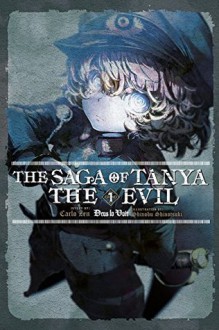
Urano is a Japanese college graduate who's absolutely obsessed with books and reading. Both she and her mom are thrilled when she gets a job at a library, but before she even has a chance to start, an earthquake causes Urano's book collection to fall on her and kill her. She wakes up in the body of a sickly 5-year-old child named Myne.
Although Myne's memories tell her that she loves her parents and older sister and they love her back, it's a little difficult for her to connect with them emotionally, since they feel mostly like strangers to her. Still, she tries to adjust to her life as best as possible, arranging things so that both she and her new family's cleanliness is improved and trying to make something resembling Japanese food without any of the proper ingredients, not even rice. The thing that's hardest for her to take, however, is the complete lack of books. The nobility can afford books, but poor commoners like her own family can't. Rather than succumb to despair, however, Myne/Urano (who I will refer to as Myne from here on out, although the real Myne is technically dead) decides that she will somehow make her own books.
As is the case with many, many recent light novels, I like the idea behind this series more than its execution. In the afterword, the author says they (I think the author is female, but I'm not 100% sure) refused to abridge Part 1 into a single volume, which I think was a mistake. I wish Japanese light novel publishers/editors were a bit firmer with their authors - far too many light novels are filled with self-indulgent bloat, and Ascendance of a Bookworm is no exception.
As I learned with My Next Life as a Villainess, though, I can be more forgiving of problems in light novels if aspects of them overlap with my interests. In this instance, the book got points for having a book-loving heroine, and the self-indulgent bloat was mostly focused on Myne's efforts at bookmaking. I was interested to see what she'd come up with next and how she'd manage it, considering that it took her weeks just to work up the strength to walk to the forest on her own.
But was it really necessary to go into that much detail on several of Myne's attempts to make something paper- or book-like? Probably not. Same with Myne's various food-making, cleanliness, and personal hygiene efforts. Literally every idea Myne had involved a long, multi-step process to figure out if this world even had the supplies she needed, if those supplies were accessible in some way to commoners, and then how to get those supplies and use them, considering that Myne's body was so weak that overexerting herself could result in being bedridden with a fever for multiple days.
Myne won me over at the very beginning due to her love of books. She was the sort of person who'd find a way to read whenever she could, and she didn't care about anything except making sure she continued to have access to books and reading time. It didn't bother her if other people thought she was odd. However, this single-minded focus eventually began to wear on me. For one thing, in a world like the one she ended up in, it made Myne seem immensely selfish. Her family was literally dirt poor, and she kept asking for things with barely a thought as to whether they could afford them or spare the time to get them. For another, she'd occasionally have tantrums more appropriate to her physical age than supposed mental age when things didn't go her way. Honestly, Tuuli, Myne's 6 or 7 year old sister, usually came across as more mature than Myne, whose mind was supposedly that of a college graduate.
Like many recent light novels, this was unfortunately written primarily in the first person. The author knew enough about POV to realize that different first person narrators would have different sets of knowledge (there were a couple bonus stories written from a couple non-Myne POVs), but not enough to create truly distinct voices (or maybe that was a translation issue?). Also, as with other J-Novel Club books I've read, there were several typos that really should have been caught before this made it to print - a sentence with really odd comma usage, a stray "1" at the end of a sentence, incorrect words like "first" instead of "fist," etc.
Despite my issues with this book, I'm glad I have the next one and can continue on. The end of the volume introduced a few characters and a shift in the storyline that I'm very interested in seeing play out. Although I'm sure that Myne will continue to be more focused on books than anything else, it looks like the series may add some economic aspects, similar to Spice & Wolf and Accomplishments of the Duke's Daughter. And since that may mean more appearances by one of my favorite characters in this book, a traveling merchant turned soldier named Otto (whose level of devotion to his wife makes him this series' version of Maes Hughes), I'm looking forward to it even more.
I really wish this had been the more tightly written novel it could have been, but so far this is decent.
Extras:
A folded page with full-color illustrations on both sides, black-and-white illustrations throughout, a map of the portion of the town Myne has access to, a drawing of Myne's family's home, and two bonus short stories, one from Lutz's POV and one prequel from Urano's friend Shuu's POV.
(Original review posted on A Library Girl's Familiar Diversions.)


 Log in with Facebook
Log in with Facebook 









